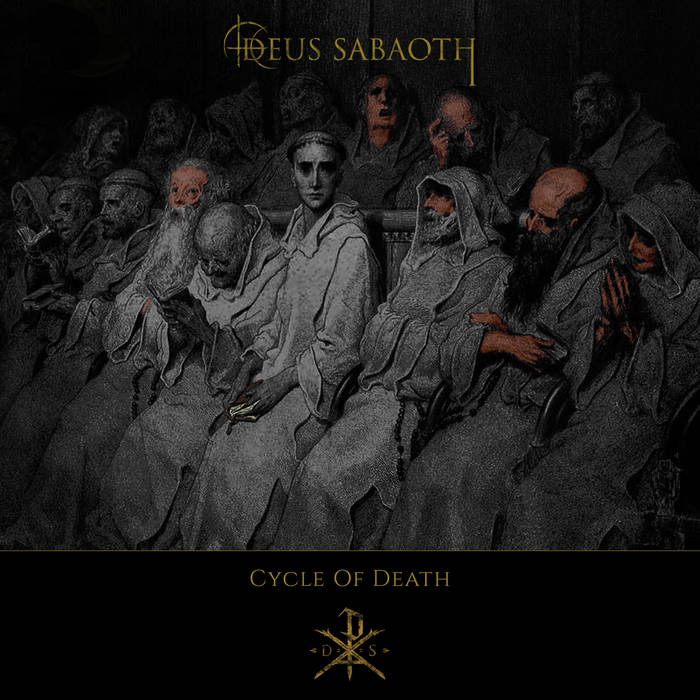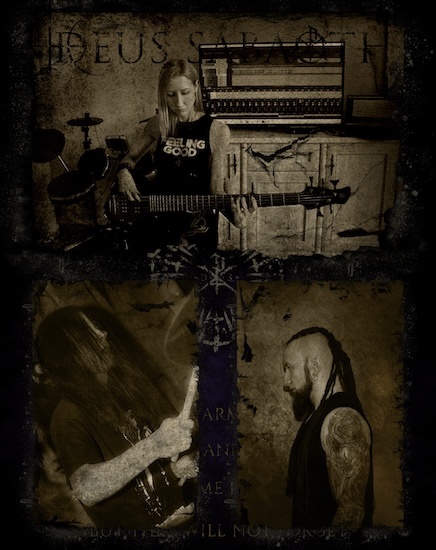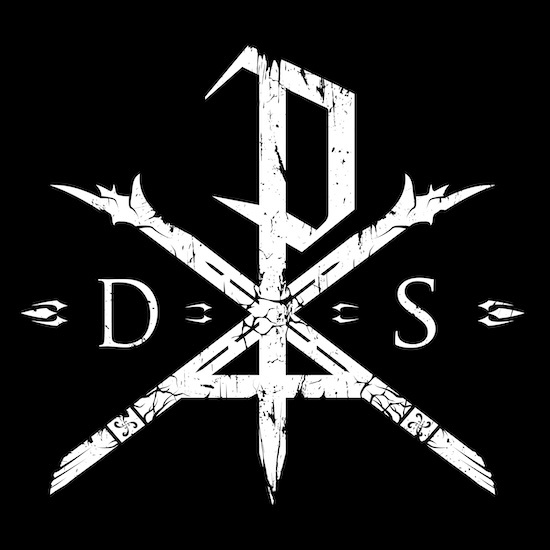
On their debut album Cycle of Death the Ukrainian band Deus Sabaoth have put purveyors of religious faith in their crosshairs. It’s not an uncommon focus for black metal bands, but this group extends their critique, both philosophically and in their music, in uncommon ways.
Regarding the philosophical concept of the album, the main theme of the lyrics “is to reflect different perspectives on religion and the existential concerns of those who confront their mortality while rejecting any religious beliefs,” and thus they “delve into a personal, internal struggle, exploring the complex emotions and conflicts faced by those who question the very nature of existence.” The following statement from the band develops these ideas further:

“Cycle Of Death is a journey through the bleak and twisted minds of its characters, captured across seven intense tracks. The album delves deep into the contrasts between the architects of faith and the consumed followers, revealing the dark interplay between belief, manipulation, and desperation.
“At its core lies the eponymous track, ‘Cycle Of Death,’ which anchors the album’s central theme: the acceptance of death, the stark recognition of life’s futility, and the inescapable loneliness. In its relentless exploration of the vanity of existence, the album invites listeners to confront the idea that, in death, humanity is ultimately isolated, no matter the illusion of belief.”
The album is set for release on January 17th, but we’re hosting its complete premiere today, and so you’ll soon see how Deus Sabaoth have expressed these ideas in their music.
In that eponymous track that’s at the core of the album, the band immediately reveal what makes their method of black metal out of the ordinary. They open it with an elegant minuet, a slow and stately dance performed with piano and flute, albeit with a deeply humming bass and heavily cracking drums in the ensemble.
When the band pick up the melody with raking and swarming guitars, they create a variation, making the melody not only more harsh but also more oppressive. They add a factor of ferocity through beastly growls, ravenous roars, caustic snarls, and blasting beats.
The scale of the music expands and becomes daunting in its grandeur. Though the piano still plays a key role, it sounds desperate in its striving, as do the swelling waves of symphonic sound, the slowly writhing and abrasive riffage, and the vocals’ harrowing howls.
Even if the band hadn’t explained the theme of the song, the music does seem to channel in powerful terms the confrontation of death, its grim acceptance, “the stark recognition of life’s futility, and the inescapable loneliness.”

As in that core song, the other tracks on Cycle of Death also create an unusual embroidery on the usual dark fabrics of black metal, by incorporating traditions of classical music, and in particular the Baroque style that followed the Renaissance, with primary debts owed to J.S. Bach.
To be sure, Deus Sabaoth repeatedly show themselves capable of racing and ravaging, deploying riffs and keys that savage, sear, and jolt, as well as drumwork that bludgeons, hammers, and chops like an axe; and the vocals are almost relentlessly striking in their intensity, often exploding in wild, ragged cries of shattering torment and fury, but also occasionally swerving into varying spoken-word expressions, some gritty, some hallowed, and some moodily sung.
Yet the band also repeatedly accent even their more unbridled storms with Baroque ingredients, including not only sweeping symphonic cascades but also performances by violins and cellos in addition to the afore-mentioned pianos and flutes. Even the piercing trill of the lead guitar reveals classical influences. And the classical instruments usually play starring roles in the songs’ softer moments.
The effect is to create a continuing dynamic juxtaposition of savagery and refinement, of ferocity and gracefulness. The juxtapositions aren’t jarring, however, even though they may be unexpected. They become different methods, both overpowering and gentle, of expressing common feelings — sensations of cruelty, fear, anger, despair, and haunting grief, with brief moments of hope and even joy.
The overarching impression of the album is one of pageantry, a grand and elaborately plotted musical narrative performed by a large cast in which even the varying forms of the vocals seem like different characters. To be sure, it’s a dark narrative, a theater of tragedy, in keeping with the songs’ lyrical themes.
It seems made to be performed in a great hall before a rapt throng, though your own head will have to do for now. So, settle in, and let this album take over:
PRE-ORDER:
https://deussabaoth.bandcamp.com/album/cycle-of-death
FOLLOW:
https://www.facebook.com/deussabaothband/
https://www.instagram.com/deus.sabaoth_band/
